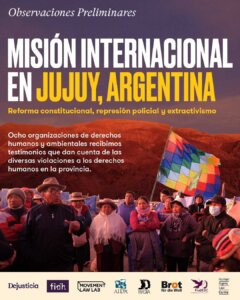29 Sep Internation Human Rights Observatory Mission in Juyjuy- Preliminary Results

From August 21-25 of August 2023, representatives of 8 civil society organizations specialized in human and environmental rights carried out an observatory mission in the province of Jujuy, Argentina. The objective of the mission was to witness first hand any possible violations of the right of assembly in the context of the constitutional reform that was approved on June 16, 2023; at which time there was a brief period where large groups prohibited from gathering in public. Said reform did not result in an atmosphere of democratic coexistence, and instead seems to have exacerbated the polarization and divide that was already prevalent in the province.
Buenos Aires, August 29, 2023. The team spent time visiting the main areas where protests have taken place in the last two months. In Abra Pampa, they witnessed a road block and surveillance of more than 67 communities, including La Quiaca, Salinas Grandes, Susques, Humahuaca, the Cross of San Roque and Purmamarca. Accounts of possible human rights violations stemming from unnecessary use of force and “less lethal” dispersion tactics, as well as arbitrary arrests and criminalization of defenders using charges and arbitrary penalties (many fines) were recorded in all of these locations.
The international mission spoke with members of indigenous people and communities, social workers, unions, human rights organizations, teachers, lawyers, and other people who spoke of different forms of individual and collective human rights violations. The team also met with provincial authorities, including the Minister of Security, the Secretary of Human Rights and Indigenous Peoples, the Public Defender’s Office, representatives of the Prosecutor, and elected representatives in San Salvador de Jujuy. The international mission did not encounter any blocks or obstacles during their time there, and for this they thank everyone who contributed their different points of view of what happened in the context of the reform.The members of the international team are in the process of analyzing the information gathered in Jujuy, which will be used to draft a report about the facts surrounding the complex reality of human rights in the province. Nevertheless, the team thinks it would be a good idea to make a few preliminary observations so as to contribute to social dialogue. This is done while respecting the autonomy of the communities and provincial government; while accounting for the obligations of the national and provincial governments which are committed to international human rights tools bound to local and constitutional hierarchies, as well as internal legislation.
Constitutional Reform without Participation
The international mission observed that despite the fact that indigenous peoples and their communities asked to participate in the constitutional reform process, it went forward without thorough deliberation. The reform process did not consult with or include representatives from indigenous peoples’ institutions, despite the many communities (around 420) that live in Jujuy and the applicability of the ILO’s (International Labor Organization) Indigenous and Tribal People’s Convention.
Based on the information gathered, there are concerns about the reform’s incompatibility with human and environmental rights; including including provisions for public lands and the lack of mechanisms to protect indigenous lands which they have inhabited for generations. The mission reminds the provincial government that inter-American jurisprudence recognized that original peoples’ land ownership rights should be protected by states.
In the context of the climate crisis and water scarcity, the reform does not adequately account for integrated management of catchment areas and the preservation of ecosystems. The reforms seem to favor industrial, agricultural, and large-scale livestock use for water resources and leave the door open to concessions that could lead to the privatization of water, harming ecosystemic cycles and harming small-scale agriculture and livestock farming; which are essential for the existence of indigenous communities.
Furthermore, by banning road closures, the reform hinders the right to demonstrate and strike, as well as the freedom of speech. The international mission believes that these measures limit rights that are fundamental for a democratic and lawful nation.
Plus, the mission received an account of the provincial judicial power’s alleged lack of independence. This could complicate the monitoring of the provincial constitutional reform to keep constitutionality and conventionality in check and reject arbitrary laws or acts of authority. One must keep in mind the importance of the separation of powers and a system of checks and balances in a democratic society.
Environmental Impact and Rights of First Peoples
Indigenous communities have repeatedly expressed concern over the negative impact of mining activity, particularly lithium extraction on their lands. It should be stressed that this type of activity requires the intensive use of chemicals and significant water resources; which imperils the sustainability of wetlands, Andes salt plains, and aquifers in general. Vulnerable wetlands have a huge impact on cultural practices and subsistence traditions and threaten the right to a healthy environment. It is the cause of many existing land conflicts and tensions near mining extraction and exploration sites in Jujuy.
Repression and Criminalization of Social Protests
Lastly, the international mission heard witness accounts of instances of police repression of social protest, arbitrary arrests, harassment, and alleged torture of indigenous people and communities, environmental defenders, teachers, women, and even children. Tactics included the use of unwarranted and disproportionate use of force, including less lethal weapons such as rubber bullets and tear gas, injuring protesters and causing bodily harm (to the head and eyes). The team also learned of violent acts affecting provincial police officers.
According to the mission, the provincial government and judicial power used intimidation limiting the right to protest and enacted policies limiting this right. For instance, they identified possible abusive persecution of crimes and misdemeanors (i.e. excessive sentences and steep fines) in an effort to discourage protests.
It was apparent in interviews that provincial authorities and institutions were generally viewed with such skepticism that people who suffered rubber bullet wounds declined to seek treatment for fear of administrative sanctions or criminal investigations had they relied on the healthcare system.
Next Steps
The team will meet with national authorities and representatives of Tercer Malón por la Paz (“The Third Peace Raid”) indigenous protest group gathering in front of the Courts of Justice in Buenos Aires. At the same time, the collected information will be organized with the aim of drafting recommendations for all stakeholders, especially provincial, national, and international authorities. The ultimate objective is to draw attention to the complex reality of human rights in Jujuy and contribute to fostering stakeholder dialogue and achieve the best possible resolution to the social unrest and the respect of human rights.
